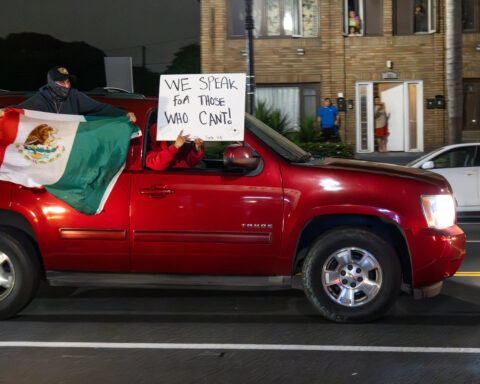
Responding to a rising trend of rapes, Gov. Jerry Brown signs a law helping protect female students. Sexual assaults at California campuses rose 11 percent since 2010.
By Katie Porter
A new state law dealing with sexual assault involving students is forcing California colleges to rethink their policies or risk losing federal funding.
Known as the “yes means yes” bill, it was signed into law by Gov. Jerry Brown last month. The law mandates that colleges must define consent and establish protocols.
The legislation is part of the government’s reaction to the rising number of sex crimes committed against college-aged women.
One in four are raped and about 95 percent of campus rapes go unreported, U.S. Department of Justice statistics show.
“Every woman deserves the right to pursue the dream of higher education without being threatened by the nightmare of violence and sexual abuse,” said Sen. Kevin de Leon, D-Los Angeles, in a press release.
De Leon introduced the bill in February.
Sex crimes on campuses are increasing. Since 2011, five forcible sex crimes have been reported at Santa Ana and Santiago Canyon colleges.
Statewide the number has risen from 276 in 2010 to 309 in 2012.
California universities have been hit hard, with 10 campuses reporting more than 20 incidents in that same three-year period. Some of those, including UC Berkeley, UCLA, USC, and Occidental College, are under federal investigation for how they have handled victim allegations.
The legislation applies to community colleges, private schools, California State University and University of California campuses.
It establishes a consent standard defined as an “affirmative, conscious and voluntary agreement to engage in sexual activity.”
This means both parties must clearly agree to participate, and can’t legally give consent if they are drunk, high or asleep. It also mentions that consent has to be ongoing and can be revoked at any time, and a lack of protest or resistance does not automatically mean yes.
“This law points out there has to be an agreement. It puts the onus back on the men …. If they do not hear or see a yes, the answer is no,” Valerie Marino, SAC human sexuality instructor said.
But the face of sexual assault is changing, especially on college campuses. Statistics from a 2007 study funded by the Department of Justice shows the top three perpetrators are friends, classmates and someone the victims is in a relationship with.
“The term ‘date rape’ doesn’t exist anymore; it’s now acquaintance rape,” said Marino. “You don’t really want to do it, but it’s a friend of yours, so saying no will make you seem weird. So you kind of go along with it quietly, but you haven’t said yes either. But because you aren’t jumping up and screaming no, the other person takes it as a yes.”
Most sexual assailants use coercion to pressure the victims. Marino says students come to her with questions all the time about personal incidences that they are unsure of, asking if it could be considered rape if it “wasn’t really violent.”
The gray area leaves victims confused and quiet. When it comes to reasons for not reporting rape, 61 percent of respondents don’t think what happened to them was serious enough and about 36 percent thought it wasn’t a crime if there was no harm.
Only about a quarter of women who have sex against their will consider themselves rape victims, according to non-profit group Culture of Respect.
Students agree with the bill’s clarification, which can prevent misunderstandings and assumptions and holds everyone accountable.
“It’s often the victim getting blamed for where she was going, what she was wearing and if she was drinking. It’s almost never on the perpetrator,” SAC student Evee Hurtado said.
- The two-party system is failing us. - October 19, 2024
- Read our Fall 2023 Print: Vol. 100 No. 1 - October 23, 2023
- Santa Ana College Awarded State Department of Finance Grant - April 2, 2015











